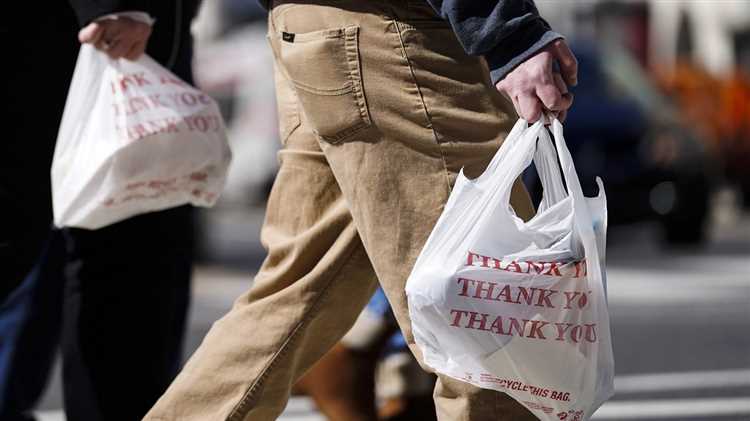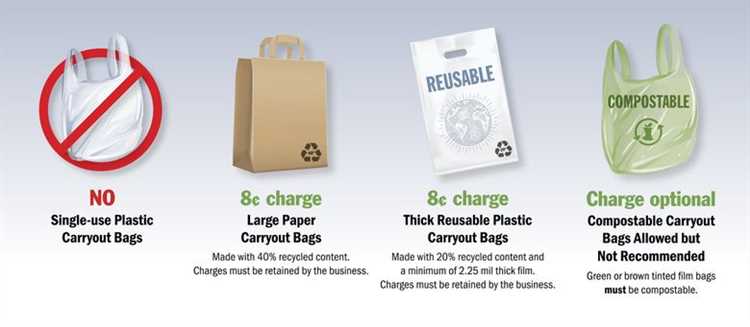In recent years, there has been a growing concern about the environmental impact of single-use plastic bags. These lightweight bags are typically used for carrying groceries and other items for a short period of time before being discarded. Many countries and cities around the world have implemented regulations and bans in an effort to reduce the use of these bags and minimize the negative effects on the environment.
Why are single-use plastic bags such a problem?
Single-use plastic bags have become a major environmental issue due to their durability, low cost, and widespread use. While they may be convenient for carrying items, they pose significant challenges when it comes to disposal. Unlike other types of plastic, these bags are not easily recyclable and end up in landfills, where they can take hundreds of years to decompose.
Additionally, single-use plastic bags are a major contributor to plastic pollution in our oceans and waterways. They can cause harm to marine life, as animals may mistake them for food or become entangled in them. Plastic pollution has become a global crisis, affecting not only the environment but also human health.
- Understanding Single-Use Plastic Bags and Their Legality
- What Are Single-Use Plastic Bags?
- The Environmental Impact of Single-Use Plastic Bags
- 1. Contribution to Plastic Pollution
- 2. Fossil Fuel Consumption
- Regulations and Bans on Single-Use Plastic Bags
- National Bans
- Regional Bans
- Question-answer:
- Are single-use plastic bags banned in all countries?
- Why are single-use plastic bags harmful to the environment?
- What alternatives to single-use plastic bags are available?
- Are there any benefits to using single-use plastic bags?
- What can individuals do to reduce their use of single-use plastic bags?
Understanding Single-Use Plastic Bags and Their Legality

Single-use plastic bags are thin bags that are commonly used by retail stores and consumers to carry items. These bags are designed to be used once and then discarded. They are typically made from polyethylene, a type of plastic that takes a long time to break down in the environment.
The legality of single-use plastic bags varies from country to country and even within different regions of the same country. In some places, such as Rwanda and Kenya, single-use plastic bags have been completely banned. In other areas, there may be restrictions on their use or a tax imposed on their sale.
There are a number of reasons why single-use plastic bags have become a focal point for environmental concern. They are often not recycled and end up in landfills or as litter in the natural environment. This can have negative impacts on wildlife and ecosystems.
Plastic bags can also pose a threat to human health. When plastic bags break down, they can release microplastics into the environment. These microplastics can be ingested by marine life and make their way up the food chain, potentially ending up in the human diet.
In response to these concerns, many countries and municipalities have taken action to reduce the use of single-use plastic bags. This can include bans, taxes, or incentives for using reusable bags. Some retailers have also voluntarily stopped offering single-use plastic bags and instead provide reusable or biodegradable alternatives.
| Country | Legal Status |
|---|---|
| Rwanda | Complete ban |
| Kenya | Complete ban |
| England | Fee for plastic bags |
| California, USA | Statewide ban |
It is important for consumers to understand the legality of single-use plastic bags in their region and to make informed choices about their use. By reducing our reliance on single-use plastic bags, we can help to protect the environment and promote a more sustainable future.
What Are Single-Use Plastic Bags?
Single-use plastic bags are lightweight and typically made from polyethylene or polypropylene materials. They are commonly used in stores and supermarkets to carry purchased items. These bags are designed for one-time use and are not intended to be reused or recycled.
Single-use plastic bags are often referred to as “checkout bags” or “grocery bags” due to their common use at the checkout counters of retail establishments. They are convenient for carrying items, but their short lifespan and lack of recyclability have led to environmental concerns and regulations.
| Advantages of Single-Use Plastic Bags | Disadvantages of Single-Use Plastic Bags |
|---|---|
|
|
Due to their negative impact on the environment, many countries and cities have implemented regulations to limit or ban the use of single-use plastic bags. These measures aim to reduce plastic waste, encourage the use of reusable bags, and promote sustainable alternatives.
It is important for individuals to understand the environmental consequences of single-use plastic bags and make conscious choices to minimize their usage. By opting for reusable bags or other sustainable alternatives, we can all contribute to a cleaner and healthier planet.
The Environmental Impact of Single-Use Plastic Bags
Single-use plastic bags have a significant negative impact on the environment. These bags are made from non-biodegradable materials, which means they do not break down naturally over time. As a result, they contribute to the growing problem of plastic pollution.
The production of single-use plastic bags also requires a significant amount of resources, including fossil fuels and water. The extraction and processing of these resources lead to greenhouse gas emissions and water pollution, further exacerbating climate change and damaging ecosystems.
1. Contribution to Plastic Pollution
Single-use plastic bags are one of the most common items found in litter and waste streams. They often end up in landfills or are improperly disposed of, leading to their release into the environment. These bags can then enter rivers, lakes, and oceans, where they pose a threat to marine life.
Marine animals, such as turtles and seabirds, mistake plastic bags for food and can inadvertently ingest them. This can lead to internal injuries and blockages, causing suffering and even death. Additionally, the breakdown of plastic bags into smaller microplastics can make their way into the food chain, eventually reaching humans.
2. Fossil Fuel Consumption

The production of single-use plastic bags relies on the extraction and refinement of fossil fuels. This process not only depletes finite resources but also contributes to air and water pollution. The emissions from fossil fuel extraction and transportation further contribute to climate change and its associated environmental impacts.
Reducing the demand for single-use plastic bags can help decrease the consumption of fossil fuels, mitigating the carbon footprint associated with their production and disposal.
3. Alternative Solutions
Many countries and cities have taken steps to reduce the use of single-use plastic bags. This includes implementing bans or charges on their distribution, as well as promoting the use of reusable alternatives. By encouraging the use of reusable bags made from sustainable materials such as cotton or jute, the environmental impact of single-use plastic bags can be minimized.
In conclusion, single-use plastic bags have a detrimental impact on the environment due to their contribution to plastic pollution and the extensive use of fossil fuels in their production. Taking action to reduce their usage can help protect ecosystems and mitigate climate change. Investing in reusable bags and supporting initiatives to ban or regulate single-use plastic bags are crucial steps towards creating a more sustainable future.
Regulations and Bans on Single-Use Plastic Bags
As awareness about the harmful effects of plastic on the environment has increased, governments around the world have implemented regulations and bans on single-use plastic bags to reduce their consumption and encourage the use of more sustainable alternatives. These regulations vary from country to country and even within different regions of the same country.
National Bans

Several countries have implemented national bans on single-use plastic bags. For example, in 2019, New Zealand introduced a nationwide ban on single-use plastic bags, making it illegal for retailers to supply them to customers. This ban aims to reduce plastic waste and encourage the use of reusable bags. Other countries that have implemented similar nationwide bans include Australia, China, and Kenya.
Regional Bans
In addition to national bans, many regions and cities have also implemented their own regulations and bans on single-use plastic bags. For instance, in the United States, California became the first state to ban single-use plastic bags in 2014. Since then, several other states, such as Hawaii and New York, have followed suit. Similarly, in Europe, countries like France and Italy have banned single-use plastic bags, while others have introduced taxes or fees on their use.
| Country/Region | Year of Ban/Regulation |
|---|---|
| New Zealand | 2019 |
| Australia | 2021 |
| China | 2008 |
| Kenya | 2017 |
| California, United States | 2014 |
| Hawaii, United States | 2015 |
| New York, United States | 2020 |
| France | 2016 |
| Italy | 2011 |
These bans and regulations aim to reduce the consumption of single-use plastic bags, which often end up in landfills or as litter in oceans and other natural environments. By encouraging the use of reusable bags or alternatives like paper bags or tote bags, governments hope to mitigate the environmental impact of plastic waste and promote more sustainable practices.
Question-answer:
Are single-use plastic bags banned in all countries?
No, single-use plastic bags are not banned in all countries. The regulations regarding single-use plastic bags vary from country to country.
Why are single-use plastic bags harmful to the environment?
Single-use plastic bags are harmful to the environment because they are not biodegradable and can take hundreds of years to break down. They also contribute to pollution and pose a threat to wildlife.
What alternatives to single-use plastic bags are available?
There are several alternatives to single-use plastic bags, including reusable cloth bags, paper bags, and biodegradable bags made from materials like cornstarch or potato starch.
Are there any benefits to using single-use plastic bags?
While single-use plastic bags are convenient, they have several negative impacts. They contribute to pollution, harm wildlife, and take a long time to break down. Therefore, the benefits of using single-use plastic bags are outweighed by the environmental costs.
What can individuals do to reduce their use of single-use plastic bags?
Individuals can reduce their use of single-use plastic bags by opting for reusable alternatives, such as cloth or biodegradable bags. They can also participate in recycling programs and choose to purchase products with minimal packaging.